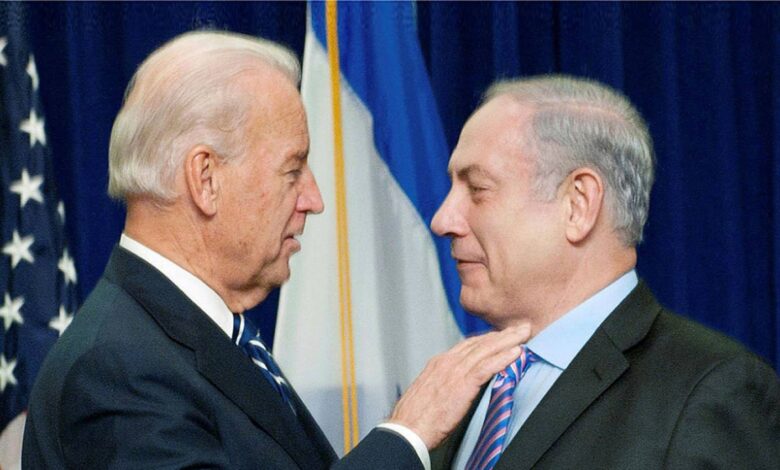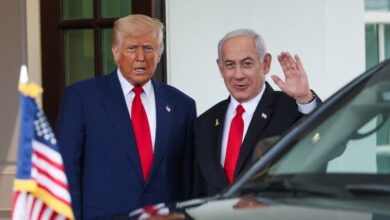
The relationship between Israel and the US is currently experiencing a noticeable strain, which further highlights the growing rebellion led by Israeli Prime Minister Netanyahu. Despite repeated requests from the US administration, Netanyahu has consistently rejected their appeals to maintain the unity of his far-right coalition and secure his position. This situation presents significant challenges to the US’s vital interests in the Middle East and globally, resulting in Washington’s increasing isolation on the international stage. The most recent evidence of this was the UN General Assembly vote on May 10. Palestine gained support from 143 countries for its full membership in the UN, with only 9 votes in opposition, including those from America and Israel. Before this, Palestine had garnered widespread support from Security Council members (supported by 12 members), while Washington had vetoed a Palestinian request to the UN Security Council on Palestine’s eligibility as a full-member state at the UN General Assembly on April 19.
In light of this risk, the US government, for the first time since the commencement of the aggression against the Palestinians on Oct. 7th of the previous year, issued a warning to halt the provision of Arms shipments to Israel. These shipments encompassed 3,500 intelligent bombs, varying in weight from 2,000 pounds to 500 pounds, to exert pressure on the Netanyahu administration to cease the further loss of Palestinian civilian lives, terminate the indiscriminate bombardment of the Gaza Strip, and prevent the invasion of Rafah, a city inhabited by approximately 1.5 million displaced individuals, predominantly originating from the northern and central regions of the Strip. These areas have endured extensive destruction as a result of continuous Israeli assaults. Within this context, President Biden expressed his intention to “suspend the delivery of offensive weaponry from the US to Israel, weapons that he acknowledged have been employed to cause harm to civilians within the Gaza Strip,” should Israel proceed with a ground incursion into the city of Rafah.
In a step back that shows that the observation angles and the way of understanding the issue in Washington are seen only from the Israeli lens, the US administration quickly retreated from its stated positions on stopping the arms shipments, in a report submitted to Congress on Friday, May 10, US senior diplomat Anthony Blinken said “it is not possible to verify whether Israel has used American-made weapons in Gaza in a way that violates international law”. According to Axios, Blinken claimed in his report that the US has received “credible and reliable” assurances from Israel that the US will continue to provide military assistance.
Mr. Blinken report, which contradicts the facts on the ground, reaffirms the US administration’s inability to defend its red lines. It seems that President Biden quickly realized that he could not exert his enormous influence on Israel by cutting off arms supplies, because he was simply trying to avoid a direct confrontation with the Israel lobbies in Washington, especially with the start of the presidential election campaign activities and the approaching date of the Democratic Party General Conference. The last thing Biden wants is to confront the powerful Israel lobby, which will pursue him with a political and financial hammer. Besides, the weapon of anti-Semitism supported by the majority in Congress of both parties is to suppress voices critical of Israel. Thus, Biden is trying to avoid repeating the confrontation scenario that plagued the policies of his predecessor Obama, when he thought about a two-state solution and tried to exert his influence on Israel, but ultimately failed.
Despite all the warnings and ultimatums from the highest levels of the U.S. government, Washington is finding it tough to halt the brutal war against the Palestinians or convince Netanyahu to cease his genocide actions, including the impending invasion of Rafah, because of the influence of the Israel-lobby and interest groups that are essential for Biden and Democratic Party candidates.
However, the political landscape in front of President Biden seems more complicated than he expected and reveals options that have become limited. On the one hand, Biden realizes that the mere thought of exerting his influence on Israel to stop the war, by blocking the flow of arms shipments and/or threatening to freeze financial aid packages from the pockets of American taxpayers, and/or lifting the international lid on Israel at the International Court of Justice, International Crimes or the UN Security Council, simply means that he is not only risking his political future as president of the US and his political legacy supporting Israel for decades, but this adventure will extend to turning the seats of his Democratic Party in both chambers of Congress (senators and representatives) in favor of his rival Trump.
On the other hand, President Biden knows that unlimited support for Israel will increase the gap of division between the two wings of the party – the liberal progressive wing that supports the Palestinian right and the old guard that supports Israel, in addition to his convictions of losing millions of electoral ballots to members of the Arab, Islamic, Latin, Asian and African communities…), University students, supporters of the Palestinian right in the US – an electoral base mostly calculated on the Democratic Party.
In the midst of the chaos, there was an opportunity, but it was quickly stopped, the US administration maneuverer into the space allowed by Israel’s lawyer (the lobby (. This is an attempt to pass a prisoner exchange deal that takes into account Netanyahu’s new red lines, and Washington, through its representative, the director of the CIA, exerted maximum influence and pressure on the armed factions in the Gaza Strip through negotiating mediators. Including, among other things, ignoring the demands for a comprehensive cessation of the war and replacing it with broad phrases such as “sustainable cessation”, the non-withdrawal of the Israeli army from the Gaza Strip…). This impossible task, which was like squaring the corners of a circle, was seen by the White House as a lifeline for the administration’s sinking policies, through which it could appease the parties of the electoral base and allies together, from one angle, calm the boiling inside the grassroots of the Democratic Party while announcing the success of the expected exchange deal, from another angle, not to cross the lobby lines. But these hopes were quickly dashed as Netanyahu rejected the mediators ‘ proposal.
In fact, Biden’s threats to suspend arms shipments are not the first time that an American president has threatened on condition of providing assistance to Israel. Historically, President Ronald Reagan stopped a shipment of artillery shells and cluster bombs in 1982 during the Israeli invasion of Lebanon due to reports of the IDF’s transgressions of international law. Reagan also stopped the shipment of F-16s in 1983 until Israel withdrew from Lebanon. But the indications are that Biden is not Reagan, and that America continues to provide Israel with all the American weapons it needs, despite its flagrant violations of international laws and Human Rights in the Gaza Strip and the Palestinian territories in general.
Even as President Biden is trying to move between the rings in an attempt to sterilize his electoral record as a returning presidential candidate, however, his threats to cut off military supplies if Israel invades the city of Rafah are no longer iron-clad. Rather, they seem to be more of a diplomatic exercise aimed at bolstering his declining electoral prospects. This development is somewhat incredulous, particularly when taking into account his longstanding pro-Israel stance throughout history.











